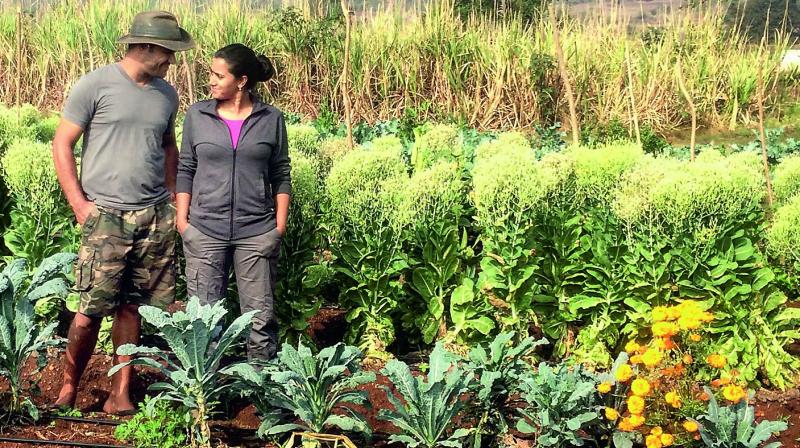Back to the roots
Several hard-core urbanites have turned to Nature with a new hobby farming. They eat and of course, share what their farms produce.

The concept of hobby farming is now catching up —this story is highly inspirational to people, who are aspiring to eat clean and live by the countryside, away from the clutter of the city and closer to nature. More than taking up farming as a hobby, the lessons learnt in managing the farm are eye openers.
City-based couple, Anjali and Kabir Cariappa, believe in the regenerative form of agriculture, where the farm is a living entity that interacts with the environment.
Anjali has been involved in sustainable farming and awareness programmes ever since she quit her wealth management job in New York and moved back to India in 2010, to convert her family’s small-scale organic farm into a fully sustainable unit. Her farm outside Hyderabad grew a diverse variety of salad-friendly crops. The fresh produce was marketed directly in Community-supported agriculture (CSA) style to city clients through a unique “friend a farmer” model.
“I wanted to leave my corporate life because it did not make sense anymore to chase the next promotion, plan paid holidays, and follow the mundane cycle of life. Living a simple life, close to nature, and away from societal pressures and the city life is what I yearned for.
“Farming made sense, because there is something so grounding in growing your own food, having nature and animals around, and getting in touch with your energy and senses,” says Anjali.
For the couple, this is their life, passion and profession. Kabir says, “We take it very seriously and enjoy every moment of it. Every farmer deserves respect, and breaking that stereotype image that exists in this country is important.”
“We can be farmers and still go out and talk about topics such as mechanical engineering, alternative energy, and conduct workshops on sustainability. We use affordable technologies as and when required, so we can adjust to the external conditions of labour and rising costs. A socially responsible farmer, who understands how food needs to be grown (like nature intends) and an intelligent consumer who understands this process is an essential partnership for our future in food,” adds Kabir.
Yarroway Farm is named after the resilient yarrow plant that has been growing on the farm over the years and has restored the farm with its healing properties. “Our flagship 50-acre farm is located along the forest ranges of southern Karnataka in India, close to the Nugu Reservoir (Mysuru District),” says Anjali.
This mother daughter duo —Likitha and Padmaja Bhanu — of Terra Greens Organic, took up farming as a hobby. “I never considered being an entrepreneur. It just so happened that we had abundant produce one season and we had to sell it, and we did. We were solving a problem and before we knew it, we were businesswomen. We consider ourselves farmers first and then entrepreneurs as that’s where our journey started,” says Likitha Bhanu.
“We have mastered large-scale farming by using traditional methods of farming. We use neem oil and neem cake for soil conditioning and pest control. We use traditional concoctions made out of different leaf extracts and cow products for pest control. Mechanical techniques like light bulbs and pheromone traps are also effective ways of pest control,” says Padmaja.
What started as growing their own food because of the adulteration and contamination found in food these days, gave birth to Terra Greens. “We are quite self-sufficient and almost everything we consume in our house comes from our farms. That’s how I started involving myself in the whole process. But yes, I love good food and I love experimenting with new ways of involving ancient grains into our daily diets,” says Likitha.
Mujtaba Hasan Askari left his high-paying corporate job to be closer to nature. “Once, a good friend of mine, showed me a pack of turmeric in which he had kept a plastic spoon and the spoon had twisted due to the chemicals mixed in the turmeric. That’s when I started looking for food that is clean, wholesome and healthy. Initially, I would travel to villages in search of organic food and buy a lot of stuff from the village Haats. I still travel to these villages, where I have got local contacts who keep feeding me with information about people growing organic stuff,” says Mujtaba, who farms in Murtuzaguda village in Moinabad.
His initial interest in putting the whole family on to eating wholesome food showed amazing results. “We stopped going to doctors for common infections like common cold, cough and fever, after we abandoned processed food. This was heartening and is the driving force behind my passion to produce and eat organic.”
Talking about challenges, Askari, says, “Even the traditional farmer today is not concerned about his or her family’s health. They are freely using deadly chemicals in the food and hardly growing anything for themselves unlike in the past. I have no plan nor intention to make money out of my hobby farming. I am happy to share my produce today with friends and my patients.”

